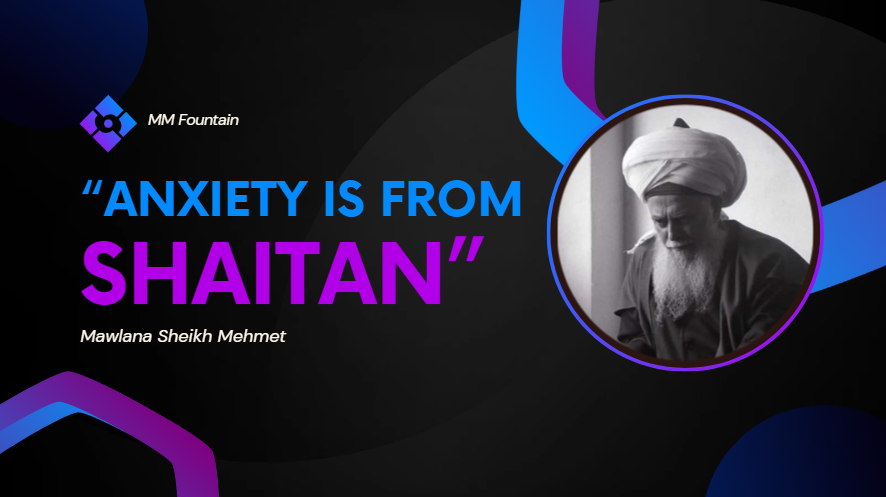Bismillahi r-Rahmani r-Rahim
Anxiety is a prevalent issue that affects countless individuals worldwide. It’s a state of uneasiness and apprehension that can manifest in various forms, making it challenging for people to lead a peaceful and productive life. However, today, we will delve deeper into the roots of anxiety, particularly its association with Shaitan (Satan), and explore practical ways to combat it.
The Nature of Anxiety
Anxiety, in its essence, is a state of inner turmoil and unease. Many individuals experience what is commonly referred to as “waswasa,” a term used to describe the relentless and intrusive thoughts that plague their minds. These thoughts often revolve around irrational fears, doubts, and uncertainties, leading to overwhelming stress and discomfort.
Shaitan’s Role in Anxiety
Interestingly, Islamic teachings shed light on the connection between anxiety and Shaitan. In Islamic belief, Shaitan is a malevolent force that seeks to lead humans astray. While Shaitan’s primary goal is to divert individuals from the path of righteousness, one of the subtle ways it accomplishes this is by instigating anxiety.
When experiencing waswasa, individuals may find themselves engaging in compulsive behaviors or rituals to alleviate their anxiety. For instance, a person preparing for prayer might become fixated on the idea that their ablution (ritual purification) is incomplete. This obsession can lead to extended periods of ablution, causing unnecessary delays and distress.
Confronting Shaitan’s Influence
To combat Shaitan’s influence on anxiety, it’s essential to recognize its tactics and respond effectively. When faced with obsessive thoughts during ablution or any other task, one powerful strategy is to challenge Shaitan directly. Simply say, “If you don’t like it, you do the ablution.”
This direct response reminds individuals that they have control over their actions and that they should not succumb to Shaitan’s manipulations. It’s a powerful way to regain agency over one’s thoughts and behaviors.
Moreover, it’s crucial to reinforce this mindset by saying, “If there is anything else you don’t like, you do it!” This declaration empowers individuals to confront their anxieties head-on, refusing to let them dictate their actions and decisions.
The Escalation of Anxiety
Failure to address and confront Shaitan’s influence can result in the escalation of anxiety. Over time, obsessive thoughts can intensify, leading to a heightened state of distress. In severe cases, this unchecked anxiety can even contribute to mental health issues.
Allah’s Benevolence and Ease
In Islam, it is essential to understand that Allah does not burden individuals with challenges they cannot bear. Even in matters as seemingly trivial as ablution, there is divine wisdom. Allah has provided flexibility within the faith to accommodate the needs and capabilities of His followers.
For instance, a person with a valid excuse can perform ablution between Zuhr (Noon) and Asr (Afternoon) prayers or after Asr when the azan is called. This ablution is valid for a specified time period, and minor disruptions, such as passing gas or a drop of urine, should not cause distress. Allah’s teachings are designed to provide ease and alleviate unnecessary hardships.
Shaitan: The Bringer of Difficulty
It is crucial to remember that Shaitan is the one who makes things difficult. Allah’s religion, Islam, is rooted in simplicity and compassion. It aligns perfectly with human nature and strives to minimize hardships. There is no obligation to engage in tasks beyond one’s physical or mental capacity.
Therefore, it is counterproductive to torment oneself with excessive rituals or obsessive thoughts. Allah’s guidance is clear, and it does not demand unnecessary suffering. It is a religion of balance and understanding, aimed at promoting the well-being of its followers.
Conclusion
In summary, anxiety is a complex issue that can be exacerbated by the influence of Shaitan. However, individuals can take control of their mental well-being by directly addressing obsessive thoughts and remembering that Allah’s religion is one of ease and compassion. By understanding the roots of anxiety and seeking guidance from Islamic teachings, individuals can find solace and lead a more peaceful life.
Remember, Shaitan’s goal is to lead astray, but through faith and resilience, one can overcome anxiety and find inner peace.
Wa min Allah at-Tawfiq. Al-Fatiha.
Mawlana Shaykh Muhammad Adil ق


